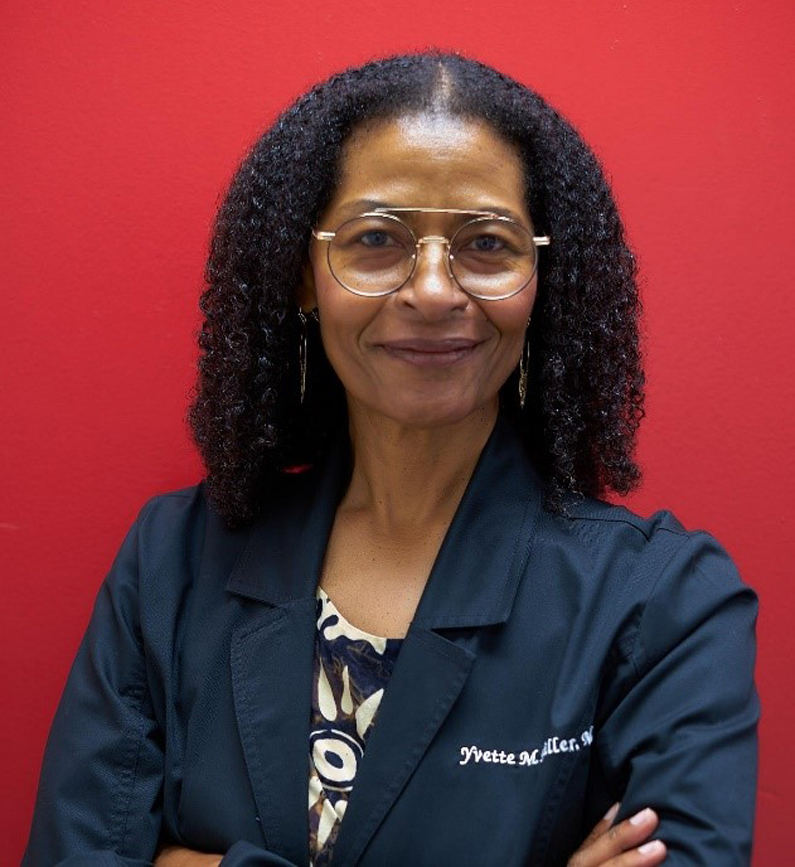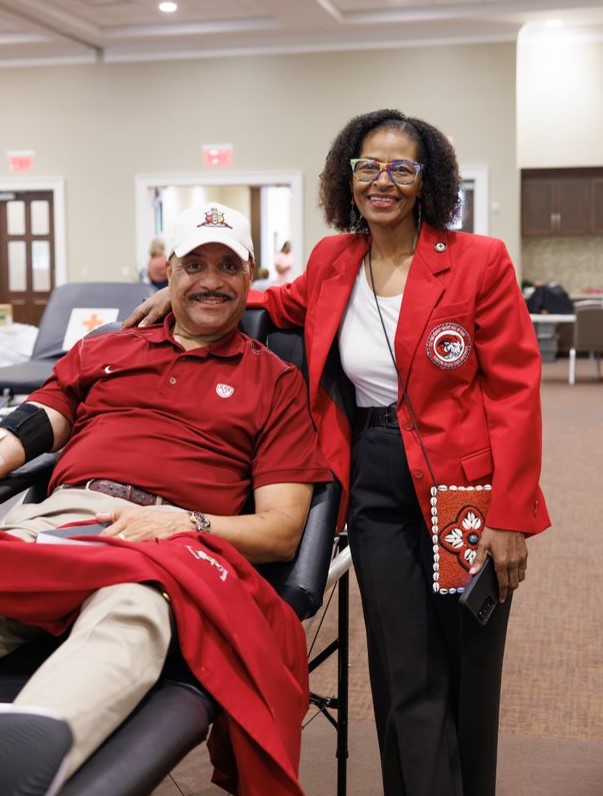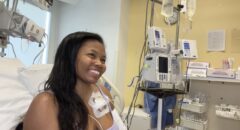
For more than 25 years, Dr. Yvette Miller has played an important role at the American Red Cross. As the Executive Medical Officer, she’s shaped clinical practices, and broadened the awareness and understanding of the plights that those living with sickle cell disease face, especially those in the Black community.
She is the epitome of Black excellence and an advocate for getting the Black community to become blood donors by leading critical conversations on structural racism and its impact on health outcomes.
Blackdoctor.org recently sat down with her to get to know the woman behind the red coat.
Could you take me back to your childhood days growing up in Winston-Salem, North Carolina? What was it like growing up?
Growing up in Winston-Salem in the ‘60s and the ’70s, was a time of great unrest because of the Civil Rights movement. It was an exciting time as a child to watch that, but growing up, under those circumstances, was concerning as well. My father was teaching at Winston-Salem State University, an HBCU, and there was student activism on that campus. My parents always impressed upon us that part of our life’s work is to give back to the community.
You’re the daughter of a nurse and physical education instructor. What about watching them made you want to pursue a career in medicine?
I loved going to school and I always enjoyed the medical shows at the time. I enjoyed watching those shows because they always intrigued me. I did a lot of reading about medicine because my mother was interested in nursing, and there were medical-related books around the house. She actually encouraged me to read and understand medicine. It was ingrained in me as a child, and I thought it would be great to follow in my mother’s footsteps. So that’s how I initially got interested in nursing.
I also learned about Dr. Charles R. Drew because the car accident he was in, was not far from Winston-Salem in Burlington, North Carolina. That accident ultimately took his life. Almost every year when we discussed important figures in the Black community during Black History Month, like Martin Luther King and Mary McCleod Bethune, we also talked about Dr. Charles R. Drew. I always greatly respected him and saw him as a role model.
You mentioned Dr. Charles R. Drew. I know you attended his university. Can you speak about your time there and how that prepared you for your career?
In medical school, we had electives, so students could elect to go abroad or go to another medical school. I knew that I wanted to go to Charles R. Drew Medical School. I was part of a program that prepares students for medical school, and that’s when I first learned about the medical school named in honor of Dr. Charles R. Drew. I did more research as a medical student and I wanted to spend time there. I did two rotations there, which honestly, were the highlight of my medical school career. I got to witness the best of the Black physicians. There were few Black physicians when I was a medical student at the University of North Carolina. But to be at a medical school where the majority of students, as well as the educators, were Black, was a phenomenal experience that I will never forget, and I still talk about it now.
RELATED: 9 Things Blacks Need to Know About Donating Blood
You just mentioned being able to be in the presence of Black physicians. What about that experience helped prepare you in terms of breaking into a career where you know that you’re going to have to advocate for the Black community, especially when there are so many health disparities?
The medical center that was associated with the Charles R. Drew Medical School came about during the “Watts Rebellion” in Los Angeles that led to loss of life. The community demanded that a hospital be built in the community because there was not any type of significant healthcare locally. That. While I was there, the physicians talked to me about my responsibility as a new physician, which in part was to advocate for and on behalf of the Black community. I took that to heart. This has always been something at the forefront of the work that I do—then and now. There is a common saying in the Black community: “if we don’t do it, who will?” and that has always led me.
Going back to your childhood for just a little bit. I know that your father passed away from bone cancer, which also played a role in your wanting to pursue medicine and cancer research. How did this translate to you doing work with sickle cell disease?
I was initially interested in research because my father died from cancer when I was entering high school. However, I ultimately made blood banking and transfusion medicine, a branch of Pathology, my specialty. So certainly, my father’s history of cancer led me to choose pathology because I love the investigation of diseases, but I wanted to learn more about the specialty.
After I finished medical school, I wanted to do research to see if that melded with my personality. I spent an entire year at the University of North Carolina Cancer Research Center doing cancer research. What I came to understand about myself is that I am a people-oriented person. When I started my residency, I knew that I would find an area of pathology where I could uphold my responsibility to the Black community to improve health disparities and inequities. When I chose to go into blood banking and transfusion medicine, I absolutely found my life’s work.
Once you joined the American Red Cross, what was it like to know that you were going to be able to continue some of the work that Dr. Charles R. Drew started?
It has been a joy to work for the Red Cross. And a little about how I ended up at the Red Cross-At the end of the first year of my two-year fellowship in blood banking and transfusion medicine at the National Institutes of Health, the program’s director, Dr. Richard Davey, told me that he was leaving NIH to become the Chief Medical Officer of the American Red Cross. One of my childhood dreams was to work for the Red Cross. I saw it as a divine path. When it was time for me to look for a position after finishing my fellowship, I contacted Dr. Davey and spoke with him about opportunities to work for the Red Cross, and he said, “Come see me, they’ll be opportunities in the Red Cross..” I ended up taking my first position with the American Red Cross in Michigan in 1996, and I owe so much to Dr. Davey. He was such a great mentor to me. I actually consider him to be a friend as well as a mentor now.
Since joining the Red Cross it has been part of my life’s mission to increase blood donations by African Americans by working with diverse organizations to get that message out about the importance of blood donation. Every two seconds, someone in the U.S. needs blood and the only source of blood are volunteer donors. African Americans play a critical role in meeting the general blood donor needs, but specifically the importance of donating blood to meet the transfusion needs of those battling sickle cell disease.
Individuals with sickle cell disease – the vast majority of which are Black – can require frequent blood transfusions throughout their lifetime to treat complications of the disease. Unfortunately, frequent transfusions can make finding compatible blood types more difficult when patients develop an immune response against blood from donors that is not closely matched to the blood of the recipient. Many individuals who are Black have unique structures on their red blood cells that make their donations the most compatible blood to help patients with sickle cell disease. In fact, blood donors who are Black are almost 3 times more likely to be a match for people with sickle cell disease.
The trajectory of my whole career with the Red Cross has been advocating on behalf of patients with sickle cell disease and not just around blood transfusion. They have a great number of needs in relation to accessing health care to ensuring that their families are taken care of.

You just spoke about the importance of advocating. How has your role at the Red Cross progressed since you first started? How has the outlook for Black patients changed for the better?
When I first joined Red Cross, my primary job was to work with the recruitment team to ensure that we had organizations that were Black and focused on diversity to schedule blood drives. Now things have progressed over time. The Red Cross has really devoted talent and resources to partnering with diverse communities. It can take a lot more time to engage diverse communities because there are multiple competing priorities for resources in the Black community. While donating blood certainly is important to the Black community, like it is for other communities, we have to understand that blood donation is important, but it might not be at the top of that list of the use of resources.
You gave a brief overview of your work and what you do, but I was wondering if you can walk me through what a typical day on the job would be like for you.
One of the first things that I do is determine donor eligibility. We do have processes and procedures in place to ensure the eligibility of blood donors. If a blood donor has a disease or is taking a medication that’s not listed, then the staff calls me or one of my other partners and we determine whether that donor is eligible. We also determine blood products suitability. For example, a person donates a blood product and then when they get home they’re not feeling well. The donor will notify our staff, and I determine whether that blood product is suitable for transfusion and whether that donor is still eligible to donate. In addition, I also conduct educational outreach. I would say about 25 to 30% of my time is spent doing presentations, outreach, interviews like this and working with our partners. The remainder of my time is spent with the sickle cell initiative, supporting partners, supporting the staff and educating our staff internally on why the initiative is important.
What would you say is the most difficult and the most rewarding part of your job?
The most rewarding part of my job is that when I look at the data, I see that we continue to invite, encourage and support people who are Black and of African American descent to donate blood. I see those numbers increasing all the time. We have a monthly report that I watch closely and every single month that report comes out, I see the strides that we continue to make. Some of the most challenging work that I do with the American Red Cross is getting the message out about health disparities and inequities in relation to patients with sickle cell disease in Black and diverse communities.
In general, one of the things that was uncovered for the world to see during the pandemic is how the Black community and diverse communities are disproportionately affected by COVID-19. These communities are disproportionately affected by all diseases, particularly hypertension, diabetes and heart disease. We see that diverse communities have been underserved and under-resourced. Even though it’s challenging, it is also very rewarding because we are at a pivotal time in this country where we’re having conversations around race and ethnicity and health disparities. It’s a conversation that’s been had in every sector and I am so privileged to be a voice of advocacy for Black and diverse communities in this work.
As you mentioned more conversations are being had about the different health disparities that affect the Black community. Where do you think the future of sickle cell disease is headed? Is there anything that you’ve seen in your work that points to what the future may look like?
I am so incredibly encouraged about meeting the healthcare needs of patients with sickle cell disease. About two years ago, researchers started a research initiative where they’re using the gene-editing tool to manipulate the gene that causes sickle cell to insert a normal gene that allows the body to make normal red cells that do not sickle. The research has shown it to be successful.
I’m also so encouraged that pharmaceutical companies are developing more medications for the treatment of sickle cell disease. From 1998 to 2017, there was a single drug on the market to target patients with sickle cell disease. Now there are several drugs on the market that are used to treat patients with sickle cell disease.
Another thing that the Red Cross has an important part to play in is that it is becoming easier to provide closely matched blood for patients with sickle cell disease when they’re in crisis. As blood transfusion is the primary treatment to treat the complication of this disease. So, the more blood that we have on the shelves, the greater the likelihood that those complications will decrease and that they’ll be able to live their healthiest and best lives.
Is there any way that your job has changed or shaped the way that you think compared to when you took this role?
Almost every single day someone or some organization is reaching out to me to give me an opportunity to be an advocate and elevate my voice, as well as elevate the voices and the needs of patients and families with sickle cell disease. I am in such an incredibly important place where Black voices are being heard. I am proud of the work I am doing and the work that the American Red Cross is doing in this space.
We talked a lot about sickle cell as a whole and the importance of breaking health disparities in the Black community. Is there anything else you wanted people to know about sickle cell, something that they may not know?
One of the most important things that people can do is be screened for the sickle cell trait (SCT). At the American Red Cross, someone who self-identifies as African American is screened for sickle cell trait. We’re focusing on this population because in this country the great majority of people who have sickle cell trait are African American or of African descent, but anyone of any background can have sickle cell disease or sickle cell trait. I’d encourage everyone to know their sickle cell trait status because it’s so important for many aspects of their lives.
It’s so simple and so important to donate a unit of blood. We are working to make it convenient for the African American community to donate blood close to the community. I’d encourage everyone to download the Red Cross Blood Donor App because you can make your appointment in the app. Just enter your Zip code and it will tell you the closest donation site. We have a tremendous amount of information on our website, redcrossblood.org, about the importance of donating blood, specifically in relation to the Black community. You can find a multitude of information about why it’s important for Black communities to donate blood.
It’s been a joy watching all of this growth and watching the Red Cross step into that space of addressing health disparities in our community.
You mentioned a lot about what the Red Cross is working on and the progress that’s been made. What’s next for you? Are there any other projects that you are working on?
Right now, my team and I are in the process of working on a manuscript that we’re going to publish about the work we are doing. I’m working with several other people in the community to get information out about the importance of diversity. Only about 3% of blood donors in this country are African American or Black. We have a tremendous amount of work to do to educate on how we can increase the diversity of the blood donor pool. Those are some of the things that I am working on individually as well as collectively with my cohorts in this space.
Is there anything else you’d like to add?
I always like to end every conversation with a call to action to encourage anyone in the African American community to donate blood. If we don’t support and help each other, who will? We should encourage everyone to donate blood. Even if you cannot donate blood, be an advocate in the community, talk about it, and make sure that people know it’s important to donate. That’s my call to action.









